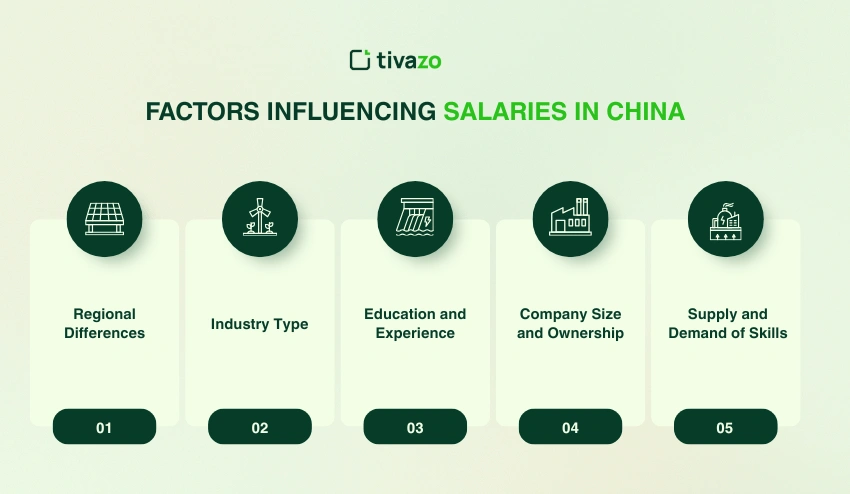The average salary in China in 2025 is one of the things that anyone planning to work, invest, or do business in China would need to understand. In China, the average salary will have an approximate of ¥125,000 CNY per year by 2025, which shows the gradual economic growth and the rising standard of living in the urban centers. The national average salary in China in 2025 would be a good reference point; however, the real salaries would be diverse based on geographical areas, sectors, and experience. Big cities such as Beijing and Shanghai are the ones that have higher salaries than in small provinces, and specialized industries such as technology and finance are the ones that pay above-average salaries.
👉You May Also Like: What Is The Average Salary In South Korea In 2025?
Through the analysis of average salary in China in 2025 by region and industry, both workers and employers will make informed choices, develop career paths, and see the overall economic picture that will influence the patterns of income in China.
Factors Influencing Salaries in China
In China, salaries are determined by various economic, social, and regional factors. The knowledge of these factors contributes to the explanation of the reason why the average salary in China in 2025 differs between industries and cities.

1. Regional Differences
The average salary in China in 2025 depends significantly on the level of economic growth of the region. Beijing, Shanghai, and Shenzhen are metropolitan cities that have better wages because of better infrastructure, higher living expenses, and also because of the concentration of multinational firms.
In China, the average salaries in smaller cities and rural areas tend to be lower in the year 2025, as the local industries and the level of investment are different. Employees who move to large cities tend to have a huge increase in income than back home.
2. Industry Type
The average salary in China in 2025 will strongly depend on the sector you are working in. Technology, finance, and specialized engineering positions tend to be better paid than retail, hospitality, or factory jobs.
Wage level is based on industry-specific skills and demand, where highly demanded expertise attracts high-paying wages. Indicatively, IT-skilled professionals will have high wages of well above the national average salary in China in 2025 because the industry is experiencing shortages of skills.
3. Education and Experience
In China, education and working experience a major determinants of earning potential. In 2025, the average wage of employees with higher degrees or specialized certification is likely to be higher in China than among employees with low formal education.
Likewise, experience in a specific area can be an income earner, as employers are ready to pay higher because of the experience that has been proven. One of the conditions for workers who want to earn a salary higher than the national average in China in 2025 is the continuous development of skills.
👉You May Also Like: Average Salary in Vietnam 2025: Shocking Income Truths
4. Company Size and Ownership
Big companies and multinational organizations tend to pay higher wages than locally owned companies or small companies. International businesses hiring in China often partner with local recruitment agencies or employer of record providers to navigate competitive salary structures, mandatory social insurance contributions, and regional labor regulations while securing qualified talentGlobal compensation standards and improved benefits make the average salary in China in 2025 in foreign-invested firms higher.
The state-owned companies might provide job security and bonuses, whereas the companies in the thriving industries can give quicker pay increments. The company size and type of ownership should be understood to determine the potential for income.
5. Supply and Demand of Skills
The Chinese supply and demand of certain skills in the job market also affect the average salary in China in 2025. Occupations with high demand and low talent supply, like AI engineers or cybersecurity experts, earn much more.
On the other hand, positions that are rich in talent and less in demand, such as entry-level administrative work or general factory work, would be likely to have a salary that is lower than the national average. To outperform the average Chinese salary in 2025, professionals should maintain the relevance and up-to-date nature of their skills.
| Profession / Skill | Demand | Talent Availability | Impact on Average Salary in China 2025 (CNY) | Remarks |
| AI Engineer | High | Low | ¥200,000 – ¥250,000 | High demand with limited talent drives top salaries. |
| Cybersecurity Specialist | High | Low | ¥180,000 – ¥220,000 | Specialized skills lead to significantly above-average wages. |
| Software Developer (General) | Medium | Medium | ¥150,000 – ¥170,000 | Lower wages due to an abundant talent pool. |
| Manufacturing Worker (Entry-Level) | Medium | High | ¥45,000 – ¥55,000 | Limited demand keeps salaries below the national average. |
| Administrative / Clerical Staff | Low | High | ¥50,000 – ¥60,000 | Limited demand keeps salaries below national average. |
It is easier to comprehend the changes in the average salary in China in 2025 by taking into account such factors as region, industry, education, and the type of company. These understandings assist practitioners and companies in making decisions in employment and investment in the Chinese labor market.
Salary Comparison by Profession in China
| Profession | Average Annual Salary (CNY) | Average Monthly Salary (CNY) | Remarks / Insights |
| Software Engineer / IT | ¥161,400 | ¥13,450 | Salaries vary with experience and city; Beijing & Shanghai are higher. |
| Finance / Accounting | ¥120,000 | ¥10,000 | Entry-level positions at the lower end; experience increases earnings. |
| Marketing / Sales | ¥100,000 | ¥8,333 | Commission-based roles may earn more; urban areas pay higher. |
| Engineer (General) | ¥90,000 | ¥7,500 | Specialized engineering skills boost pay. |
| Factory Worker | ¥45,305 – ¥69,480 | ¥3,775 – ¥5,790 | Salaries are generally below national average; vary by region. |
| Teacher (K-12) | ¥80,000 | ¥6,667 | Private schools and international programs offer higher salaries. |
| Healthcare Professional | ¥110,000 | ¥9,167 | Doctors and specialists earn more than nurses and general staff. |
| Administrative / Clerical | ¥60,000 | ¥5,000 | Salaries are generally below the national average; vary by region. |
Most Common Outsourced Industries in China
China has emerged as the outsourcing center in the world, providing low-cost solutions in various industries. The knowledge of the most popular outsourced industries in China would enable businesses and employees to determine the effect on wages and the average salary in China in the year 2025.
1. Manufacturing
The biggest outsourced sector in China is manufacturing, which includes electronics, textiles, and consumer goods. Global companies take advantage of a cheap labor force and high efficiency in manufacturing offered in China to save on costs without compromising quality.
The average salary in China in 2025 for manufacturing jobs ranges across the board, with factory workers making between ¥45,305 and ¥ 69,480/year. In the manufacturing industry, low wages are earned by the employees, unlike in high-tech sectors, yet it is still one of the industries where millions of people work, creating the main structure of the Chinese outsourced economy.
📖Related: What Is the Average Salary in Mexico? [ Best 2025 Guide ]
2. Information Technology (IT) Services
China has IT outsourcing involving software development, app development, and technical support. As the number of talented software engineers increases, in the year 2025, the average salary in China among IT professionals is about ¥161,400, and this is an indication of high demand in the industry.
The companies can take advantage of the competitive prices and access to technology talents, whereas the employees get to grow their careers and have a chance to work on global projects. The IT industry is very profitable as one of the outsourced industries in China.
3. Customer Support and Call Centers
Customer service outsourcing involves call centers, online support, as well as helpdesk services. The salary of customer support positions tends to be lower than that of technical or specialized jobs, yet these jobs have become very common, particularly in metropolitan areas.

The mean earnings of a customer support job in China, in 2025, are between 60000 and 80000 per year. Outsourcing within this industry enables international firms to offer 24/7 services, taking advantage of the high number of labor force in China.
4. Logistics and Supply Chain
Outsourcing of logistics comprises warehousing, transporting, and inventory. The strategic location and the infrastructure of China make it a perfect destination for global supply chains, which will have an effect on the average wage of the logistics professionals in China in 2025 and will be approximately ¥80,000 annually.
It is these roles that are necessary to ensure efficiency in international trade. As the market of e-commerce increases, logistics outsourcing is on the rise, offering steady employment.
5. Research and Development (R&D) Services
China has also turned out to be a country where research and development are outsourced, e.g., product design, engineering research, and even innovation work. Firms enjoy the advantage of reduced expenses and employ highly skilled specialists, whereas employees working in the research and development sector enjoy above-average salaries.
The average salary in China in the year 2025 for R&D experts will be between 120-180000 per year, based on experience and industry. Not only does this sector enhance the status of China in terms of global innovation, but it also providing high-paying employment opportunities to skilled labourers who wish to earn higher than the national average wage in China in the year 2025.
The opportunities provided by the outsourced industries in China are varied and have a direct effect on the average salary in China in 2025, across the various sectors. The awareness of these industries assists the employers as well as employees to make wise decisions concerning careers and investments in businesses.
👉Related: Average Salary in Japan 2025: Best Earnings in Japan
What is the average monthly salary in China?
The monthly average salary in China is projected to be approximately ¥10,417 in 2025, and it can be noted that the wage increase is slow in the country. Nonetheless, in China, the average monthly salary may vary greatly according to the place, industry, and experience. Big cities such as Beijing, Shanghai, and Guangzhou are more likely to give higher salaries, whereas the smaller cities and rural regions are relatively less likely to pay high salaries. Specialization employees like IT, finance, and engineering tend to earn more than the monthly average salary in China, but factory and low-level jobs tend to be below average.
Monitoring the average monthly pay in China will give good information to both job seekers, employers, as well as the expatriates who are planning careers or investments in the Chinese market.
What is the average yearly salary in China?
By 2025, one can forecast the annual average salary in China is about ¥125,000 CNY in China, which will indicate the gradual increase in salaries in different industries. Although this amount is considered to be a rough estimate, the average annual salary in China may vary significantly depending on the industry, experience, and location. Big cities such as Beijing, Shanghai, and Shenzhen are expected to have higher annual wages because living standards are more expensive and the economic activity is concentrated. Technical, financial, and highly technical engineers and other professionals can make a lot more than the average annual salary in China, but lower-level, administrative, or factory jobs can make less.
Knowing the average annual remuneration in China will enable people and companies to make sound financial and career choices.
Average Salary in China for Factory Workers
The average salary in China of factory workers in 2025 is forecasted to be between ¥45305 and 69480 CNY yearly. The average wage of factory workers in China is dependent on factors like experience, location, and the manufacturing industry. The higher wages are normally paid in major cities and industries with high demands, whereas the lower end of the range is normally paid in smaller cities and less specialized factories.

Knowledge of the average wage that factory workers receive in China can assist job seekers, employers, and businesses in making wise choices regarding employment, salary, and career management in the manufacturing industry of China.
Is it cheaper to live in China or the USA?
The cost of living in China is usually lower as compared to that in the USA, depending on the city and lifestyle. Major cities in China, such as Beijing and Shanghai, cost more, particularly in terms of housing and international schools; however, the general cost of food, transport, and services is generally cheaper compared to most American cities. The cost of living can be much cheaper in smaller cities in China or in rural regions, and the daily expenses become much less expensive. On the other hand, the USA boasts of higher average salaries, yet higher prices of housing, medical, and education tend to neutralize the income.
Here’s a clear comparison with numbers for 2025:
| Expense Category | China (Beijing/Shanghai) | USA (New York/Los Angeles) |
| Average monthly rent (1‑bedroom apt, city center) | ¥7,000 – ¥10,000 (~$950 – $1,350 USD) | $2,500 – $3,500 USD |
| Groceries (monthly for 1 person) | ¥1,500 – ¥2,500 (~$205 – $340 USD) | $300 – $450 USD |
| Public transportation (monthly pass) | ¥150 – ¥250 (~$20 – $35 USD) | $120 – $150 USD |
| Eating out (mid-range meal) | ¥30 – ¥80 (~$4 – $11 USD) | $15 – $30 USD |
| Utilities (electricity, water, internet) | ¥400 – ¥800 (~$55 – $110 USD) | $150 – $250 USD |
| Average monthly salary | ¥10,417 (~$1,420 USD) | $5,000 – $6,000 USD |
Cost of Living vs Salary in Different Chinese Cities
| City | Average Annual Salary (CNY) | Average Monthly Salary (CNY) | Average Monthly Rent (1‑Bedroom, City Center) | Groceries / Monthly | Transportation / Monthly | Remarks / Purchasing Power |
| Beijing | ¥166,800 | ¥13,900 | ¥9,000 | ¥2,500 | ¥200 | High salary but expensive city; tech & finance pay well above average. |
| Shanghai | ¥125,000 | ¥10,417 | ¥8,500 | ¥2,300 | ¥180 | Salary slightly lower than Beijing; cost of living still high. |
| Shenzhen | ¥130,000 | ¥10,833 | ¥7,800 | ¥2,200 | ¥160 | Growing tech hub; higher wages in IT and finance sectors. |
| Guangzhou | ¥95,000 | ¥7,917 | ¥6,000 | ¥1,800 | ¥150 | Moderate cost of living; decent opportunities in trade and services. |
| Chengdu | ¥80,000 | ¥6,667 | ¥4,500 | ¥1,500 | ¥120 | Lower salary but affordable living; suitable for mid-level professionals. |
| Wuhan | ¥78,000 | ¥6,500 | ¥4,200 | ¥1,400 | ¥100 | Lower costs offset lower salary; growing industries in education & manufacturing. |
| Xi’an | ¥70,000 | ¥5,833 | ¥3,800 | ¥1,300 | ¥90 | Affordable city for young professionals; salaries below national average. |
Salary Growth Trends in China Over the Past 5–10 Years
| Year | Average Annual Salary (CNY) | Average Monthly Salary (CNY) | Remarks / Trends |
| 2015 | ¥67,000 | ¥5,583 | Baseline for past decade; moderate urban-rural gap. |
| 2016 | ¥72,000 | ¥6,000 | Slight increase due to economic growth and inflation adjustments. |
| 2017 | ¥78,000 | ¥6,500 | Growth accelerated in tech and finance sectors. |
| 2018 | ¥83,000 | ¥6,917 | Urban areas see faster wage increases than rural regions. |
| 2019 | ¥88,000 | ¥7,333 | Industrial upgrades boost salaries in manufacturing and IT. |
| 2020 | ¥95,000 | ¥7,917 | COVID-19 slowed some sectors but tech and online services surged. |
| 2021 | ¥100,000 | ¥8,333 | Continued rise in high-demand sectors; recovery after pandemic. |
| 2022 | ¥108,000 | ¥9,000 | Average salary growth driven by urban centers and tech industry. |
| 2023 | ¥115,000 | ¥9,583 | Inflation adjustments and skill-based pay increases. |
| 2024 | ¥120,000 | ¥10,000 | Skilled professionals see above-average salary hikes. |
| 2025 | ¥125,000 | ¥10,417 | Projected national average; high-demand sectors continue to lead growth. |
Salary Negotiation Tips in China
It takes a combination of cultural sensitivity, market skills, and effective communication to negotiate your salary in China. The first step is to know the average salary in China in 2025 in your industry and role, and use it as a point of reference to determine whether the offer is competitive. Here are the tips:
- Research the average salary in China in 2025 for your industry, role, and city to know what to expect.
- Highlight your skills and expertise, especially in high-demand sectors like IT, finance, and engineering.
- Prepare evidence of your achievements and past performance to justify a higher salary.
- Consider total compensation, including bonuses, housing allowance, social insurance, and other benefits.
- Understand local negotiation culture: be polite, professional, and patient, as harmony is valued.
- Compare offers across companies to identify what is competitive and reasonable.
- Emphasize unique contributions you bring to the company that exceed the typical candidate profile.
- Practice your negotiation conversation to communicate confidently without being aggressive.
- Be flexible: sometimes benefits or professional development opportunities can compensate for lower base pay.
Conclusion
It is absolutely necessary to know the average salary in China in 2025 when one wants to have a career, business venture, or even an investment in the country. The pay is highly differentiated depending on where it is, the sector, experience, and skills, with large cities and high-demand sectors paying above-average wages. Taking into account regional disparities, industry trends, cost of living, and salary increase during the last decade, professionals will be able to make the right choice and plan their career. In addition, the knowledge of negotiation tactics and outsourcing opportunities in the industry could be used to maximize the earning potential.
All in all, being aware of the average salary in China in the year 2025 will enable both the employees and the employers to manoeuvre in the Chinese job market.




